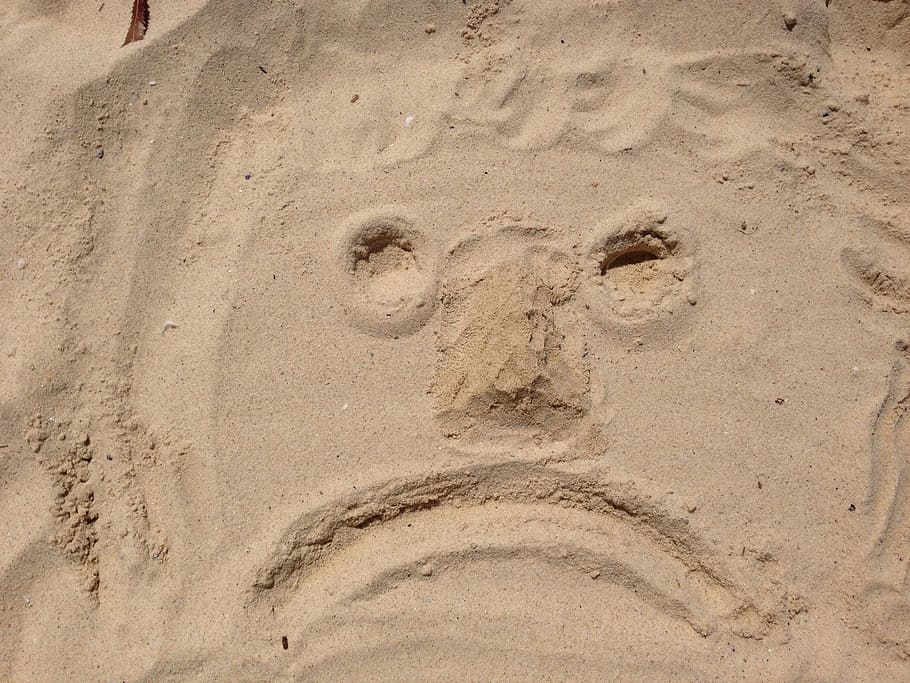The Illusion Game maintains itself by giving us lots and lots of red herrings to follow; the rule for this game is very simple – we have to keep on chasing the red herrings! The other rule of the game – we could say – is also very simple – the other rule of the game is that we must never learn to spot the red herrings for what they are. ‘Never learning’ – never gaining any insight into what’s really going on – is of course an essential part of the game since the game would immediately be over were we to gain insight into it.
The instigator of this game (the ‘admin’) is thought, which is our ‘mechanical way of making sense of the world’. Thought has two modalities, two ‘aspects’, two ways of manifesting itself – one way is as a faithful servant and the other is as a terrible tyrant. It is thought in its tyrannical manifestation that runs the Illusion Game, the point of which is to prevent us from ever seeing it for what it is.
To hear that ‘thought, like fire, is a very useful servant but a terrible master’ (or words to that effect) doesn’t in the least bit free us from thought’s tyranny. When we read this, or hear it said, we may think that we understand it but this is precisely the problem – anything we think we understand we don’t and for us to think we can have insight into the nature of the thinking mind via the thinking mind is quite ridiculous. To think that we can understand anything about thought simply by thinking about it is preposterous.
We can’t understand about the two ways in which thought can manifest itself when it continues to be our lord and master in all things. We can’t understand anything about the machine of thought when we continue to let it to operate us. Thought will tell us “Yes, that is very true – that is very true indeed…” and we will nod wisely along with it, but what we think we understand won’t make the slightest bit of difference to us. It won’t disturb our sleep in the least – if anything, we’ll sleep all the better for it! We’ll feel more comfortable not less; we will feel more comfortable because now we imagine that we have ‘an immunity to the danger’ because we have understood something important. We imagine that we’ve learned the lesson that needs to be learned and that we are now wiser as a result, and this is a pleasant kind of illusion. It is highly agreeable to us to be afflicted by the illusion of ‘knowing stuff that most other people don’t know’ and so we are hardly about to question it. Our pride has been nicely flattered and so we’ll hang on to this particular illusion, thank you very much…
Thought is always one step ahead of us – we are slow and ridiculously easy to fool (since someone who wants to be fooled is guaranteed to be easy to fool) – whilst thought is both fast and infinitely resourceful when it comes to maintaining its hold on us. Thought is the shrewdest operator in town and we’re so incredibly naive that we are practically begging to be fooled. We simply don’t have a clue as to what it is that we’re up against, and as a result we imagine that we have already won the battle…
It’s no good trying to intellectually understand the idea that thought is controlling us. To try to understand this point is to play right into its hands –we’re actually asking to be controlled. If I feel that I have a handle on the thinking mind and its tricks then this is only because the thinking mind tells me that I do (or allows me to think I do) and I allow myself suitably reassured on this point. When thought tells us that we have understood what needs to be understood then we are pleased, we feel that we have accomplished something, and so we can go straight back to sleep. We’re ‘resting on our laurels’ (even though we haven’t actually earned any laurels in the first place).
This principle can’t be rationally understood; it can only be seen and seeing this is not in the least bit comfortable (or comforting) for us – it is the singular most uncomfortable awareness that it is possible to have. To become aware of the way in which thought contains us, the way in which it absolutely controls us is – to put it very mildly – extraordinarily challenging and we just don’t have the stomach to see such a thing. We just don’t want to know; no one wants to confront the harsh truth of our situation and thus – when it comes down to it – we opt to deceive ourselves and remain asleep instead. We hypnotize ourselves with our own interminable bullshit.
‘Sleep is very comfortable, but waking is very bitter’, Gurdjieff tells us. ‘Waking up’ has nothing to do with multi-coloured unicorns, Angel Healing or ‘manifesting abundance’, or anything like that. Of all the grim struggles that might possibly await us in our lives, this is the grimmest! It’s no wonder at all that we in the West have invented our own candy-flavoured version of the spiritual path, complete with as many multi-coloured unicorns and healing angels as anyone could possibly want! This is the only type of spiritual journey we have an appetite for – this is the only one that sells. Who after all could sell ‘waking up’ for what it really is? As C.G. Jung has said,
One does not become enlightened by imagining figures of light, but by making the darkness conscious. The latter procedure, however, is disagreeable and therefore not popular.
It’s not always easy to see how dangerous a world made of illusions actually is. Samsara doesn’t look too bad to those who dwell within it – it doesn’t necessarily look bad at all! Generally speaking, Samsara looks pleasant and nice and replete with all sorts of fun-filled possibilities, just as Disneyland does to the folk who pay to visit it. It is because samsara seems so convivial and full of possibilities to us that we are happy to spend all our time wandering around in it. Our culture, as Sogyal Rinpoche has noted, has proved to be superlatively good at selling Samsara – no one does it better, in fact. No one can sell Samsara as well as we do, but at the same time it’s not as if we are going to benefit from our undoubted genius in this department. It’s not as if those who wander forever in Samsara stand to gain anything from their endless wandering.
The mind throws sticks, and – as Milarepa has observed – we chase after them and bring them back to our master, our tails wagging feverishly. We are very far from being like ‘lions’ in this respect – we are domesticated to the core. The sticks which the thinking mind throws for us to fetch aren’t real, they are distractions, they are illusions – red herrings that are designed to prevent us from paying attention to what actually is real. We chase each and every stick that is thrown because we think there is benefit to us in it, but it always turns out that there isn’t – there is no benefit to be had from chasing illusions.
The mind keeps on throwing the sticks and we keep on chasing them – we are unable – it seems – to learn anything from the experience of being disappointed every single time. Next time we we’ll be luckier, we say to ourselves, but we never are (and eventually, of course, we’ll run out of time). We only have so much time, after all; as has so often been noted, we act as if we’re immortal, we act as if we have all the time in the world, but we don’t – as we are bound to discover, sooner or later. Hence the following quote from Padmasambhava, in the Tibetan Book Of The Dead –
“O, [you], with your mind far away, thinking that death will not come, Entranced by the pointless activities of this life, If you were to return empty-handed now, would not your [life’s] purpose have been [utterly] confused? …’
The ‘rule of the game’ (we could say) is that we must never turn around to look at who it is that is throwing the sticks. We must never investigate what is producing all of these multitudinous the red herrings. In order to play the game we must always look where we’re supposed to look; we must always be orientated towards the outside (which is to say, towards the blank screen that thought is projecting its illusions onto, or towards the cave-wall where the shadows are being cast). When thought is our master then we live our lives entirely on the outside; when the thinking mind is the master of ceremonies then we don’t even know that there is ‘an inside’. The possibility that there could be this thing called ‘an inside’ doesn’t make any sense whatsoever to us.
When thought is our master then this means that we are the eager, panting dog, always keen to play the game of fetch, always motivated to repeat the same trick. It’s not all fun and good times however – we might get the doggie-treats if we complete the allocated task, but we also stand to get a painful whack with a big stick if we don’t. There is, in this situation, both the carrot and the stick – if the treats don’t work then there is always the threat of a good hard kick in the backside to spur us on our way!
What the ‘sticks’ (or ‘red herrings’) come down to our mind-generated goals – goals are what preoccupy us, goals are thought throws out by the dozen to keep us distracted. Goals are – by their very nature – ‘always on the outside’ and we are tireless in our pursuit of them. In this trivial, goal-obsessed world that we have created for ourselves, all there is is the frantic struggle to obtain what thought says is ‘good’, what thought says will ‘benefit’ us. We bend over backwards to do everything the thinking mind says. What really would be of benefit to us however would be to ignore all of the sticks that are being thrown and turn round to face the thrower.
.
What really would be of benefit to us would be to cease our automatic obedience to thought, to not idolise it and worship in the way that we do. What we benefit us would be to learn put it in its proper place. Then, the thinking mind will do our bidding rather than vice versa. We can summon the all-powerful genie to do our bidding if we wish, but we can also just as easily dismiss him again, if that’s what we want. In the West we think we’re great because we can ‘summon the demon’ – it simply doesn’t occur to us that we need to know how to banish it too, if we are not to be eaten alive, along with everyone else around us.
Image – medium.com/feeder/list-the-un-hidden-street-art-in-romania-book-files






